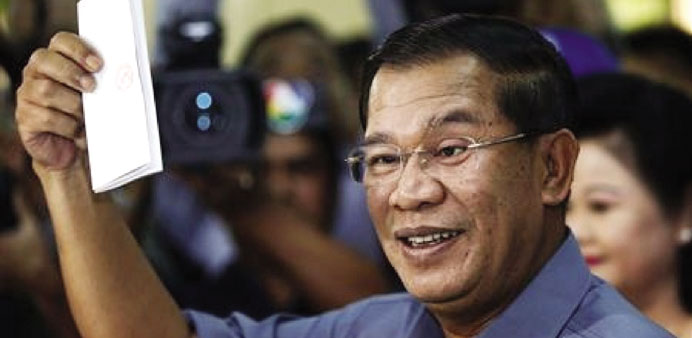AFP/Phnom Penh
Cambodia’s strongman premier yesterday brushed off recent criticism over a string of lengthy jail sentences handed to opposition activists, adding that there would be no political deal for their release.
A group of 11 Cambodian opposition members and activists were jailed on insurrection charges last week -- including three who received 20-year sentences -- an outcome rights defenders and relatives decried as disproportionate and politically-motivated.
The conviction triggered a fresh wave of criticism against premier Hun Sen for stepping up suppression of dissent in a kingdom that he has led for more than three decades.
The jail terms for the opposition Cambodian National Rescue Party (CNRP) campaigners stemmed from clashes between protesters and authorities last July during a demonstration over the closure of Freedom Park, a key site for public rallies in Phnom Penh.
The CNRP had expressed hopes that a political deal might win the group their freedom -- a suggestion Hun Sen flatly rejected yesterday.
“I can meet everybody -- except terrorists,” he said during a religious ceremony in Phnom Penh. “But if they bring me court issues which are not in my power to discuss, then I will not talk with them.”
“I do not have any rights on this issue,” he added, urging the activists to “find good lawyers” to help them appeal against what he described as “lenient” sentences.
Hun Sen also hit out at foreign groups and local rights defenders for ignoring the injuries sustained by security guards during the protest.
On Friday, the UN High Commissioner for Human Rights described the convictions as a “worrying development” adding that “there were irregularities in the conduct of the trial”.
Earlier yesterday opposition deputy leader Kem Sokha visited the 11 inmates and said he hoped to seek their release through a political deal.
“The culture of dialogue can be a door to have them released,” he told reporters.
The insurrection charges levelled against the activists last year came during a protracted political standoff between the ruling Cambodian People’s Party (CPP) and the CNRP.
At the time opposition lawmakers were refusing to take their seats in parliament, alleging that a 2013 general election had been rigged.
But their year-long boycott ended a week after the charges were laid against the activists with the CNRP taking its seats in parliament in return for electoral reforms.

Premier Hun Sen.
